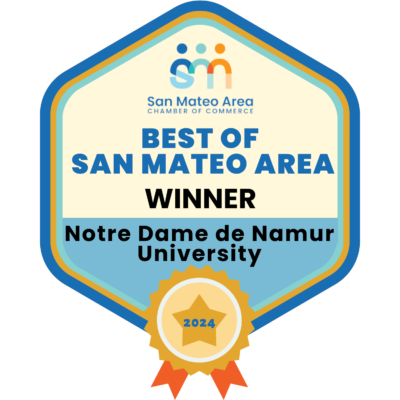
13 Benefits of a STEM Master’s Degree
November 28th, 2024
13 Benefits of Earning a STEM Master’s Degree
In today’s fast-paced world, the demand for highly skilled professionals in the science, technology, engineering and mathematics (STEM) fields continues to grow. One way to gain a competitive edge and unlock numerous career opportunities is by earning a STEM master’s degree. Going beyond a bachelor’s degree, a master’s degree offers a deeper level of specialization and expertise.
According to the U.S. Census Bureau, more students are continuing their education at this level. Between 2011 and 2021, the number of people with a master’s degree grew from 16 million to over 24 million.
Given this trend, earning a graduate degree can be a great way to keep up with and advance in industries of all kinds. More specifically, though, there are a few unique benefits to earning a STEM master’s degree — especially in an economy that’s becoming more and more dependent on advanced hardware, software, and data science techniques.
13 STEM Master’s Degree Benefits
Pursuing an advanced STEM degree is an investment. Like any other investment, students must weigh the costs against the potential benefits. Fortunately, earning a master’s degree in a STEM-related field can come with many professional, economic, and personal benefits.
1. Enhanced Expertise and Specialization
Earning a STEM master’s degree allows students to delve deeper into the technical aspects of their chosen fields. In addition to advanced coursework, STEM degree programs foster this development by engaging students with hands-on training and research projects that tackle real-world issues.
While the specific skills students learn varies from program to program, STEM degree programs teach students transferable skills, such as how to:
- Solve intricate problems
- Develop innovative solutions
- Contribute to advancements in their fields
- Work with diverse teams of engineers, analysts, and other specialists
- Communicate complex information to executives and other stakeholders in their organizations
With an in-depth understanding of the core technical principles of their fields, students can take on and excel in advanced, specialized roles in everything from business administration to technology management.
2. Increased Employability
According to a 2024 survey conducted by the National Association of Colleges and Employers (NACE), the majority of employers prioritize candidates with problem-solving skills, technical skills, and a detail-oriented approach to their work. Building these skills is a central part of STEM master’s degree programs of all kinds.
In addition to demonstrating a job candidate’s hard skills, a master’s degree in a STEM field can convey a commitment to continuous learning and an ability to acquire specialized knowledge. This can set candidates apart from others, giving them a competitive edge in an ever-changing job market.
3. Expanded Career Opportunities
A STEM master’s degree opens up a wide range of career paths and opportunities. STEM program graduates often go on to become analysts; supply chain logisticians; information technology (IT) administrators; and executives who oversee large, multidepartmental initiatives.
Just as important, a STEM degree can help students take on these positions and more in a number of industries, such as:
- Research and development
- Pharmaceuticals and medical research
- Infrastructure and construction
- Data management and security
- Commerce and retail
- Finance
- Transportation
- Academia
- Industry and manufacturing
- Entrepreneurship
With a master’s degree, professionals have the flexibility to explore various avenues within their fields and pursue positions that align with their passion and interests. This allows them to make meaningful contributions in their chosen industries.
4. Higher Earning Potential
A STEM master’s degree can significantly increase a professional’s earning potential. In 2023, the National Science Foundation (NSF) reported that the median salary for STEM workers was about $24,000 higher than the median salary for non-STEM workers. Similarly, a 2023 report from the U.S. Bureau of Labor Statistics (BLS) showed that workers with master’s degrees across all specialties typically made more than their colleagues with bachelor’s degrees.
By investing in a STEM master’s degree, students not only expand their knowledge but also position themselves for long-term financial success, allowing them to enjoy better earning potential over the course of their careers.
5. Access to Cutting-Edge Research
By pursuing a STEM master’s degree, students gain access to advanced research facilities and technologies. This opens up opportunities for them to work alongside esteemed experts as they conduct groundbreaking research with real-world applications.
Immersion in innovative projects equips students with both practical skills and invaluable experience. At the same time, these experiences expose students to emerging trends and give them the chance to make significant contributions to their industries before graduation.
Engaging directly in research also nurtures critical thinking and problem-solving abilities they can use in any number of industries and roles. This empowers them to leave a lasting impact in their chosen area through hands-on involvement in cutting-edge research projects.
6. Networking Opportunities
Because STEM master’s degree programs are typically hands-on, they can provide valuable networking opportunities. These include professors, classmates, and industry professionals.
As important as these interactions are to a student’s education, they can also lead to long-term opportunities, such as:
- Professional collaborations
- Internships
- Mentorships
- Job offers
Building a strong professional network also enhances a student’s visibility and grants them access to valuable resources and guidance. Interacting with diverse individuals fosters new perspectives and expands horizons. These connections can shape career trajectories and open doors to unexplored possibilities.
7. Professional Development
A STEM master’s degree lays the foundation for continuous professional development. This is enabled through rigorous coursework, projects, and research — all of which are staples of STEM programs of all kinds.
This cultivates essential skills, such as:
- Problem-solving
- Critical thinking
- Analysis
As students learn these skills, they can acquire a strong work ethic and learn to navigate complex challenges. This allows them to adapt to rapidly changing circumstances.
These transferable skills are highly valuable in diverse industries. In fact, the 2024 NACE survey found that about 70% of employers prioritize both adaptability and a strong work ethic. Armed with this forward-thinking mindset, students can position themselves as highly skilled professionals in a competitive job market.
8. Leadership and Management Roles
While IT professionals, engineers, and other specialists often pursue STEM degrees at the master’s level, they can also help students take on leadership and management positions. This is because at the master’s level, STEM programs teach students how to apply their technical knowledge to organizational issues.
For example, many STEM programs feature classes on:
- Strategic decision-making
- Project management
- Team leadership
These skills allow students to tackle complex challenges and guide others to success. This unique combination of technical expertise and leadership skills can set students apart as potential leaders in their fields who can lead interdisciplinary teams, communicate effectively, and push their colleagues and organizations forward.
9. Contribution to Society
A STEM master’s degree empowers students to make meaningful societal contributions. Through research, technological advancements, and innovative problem-solving, they can address critical issues that affect entire communities.
For example, many STEM program graduates use their expertise to tackle the following challenges:
- Climate change
- Healthcare access
- Sustainable development
- Food insecurity
- Educational inequality
- Urban planning
By applying their expertise to systemic issues, STEM professionals can become agents of positive change. Furthermore, by leveraging their collaborative skills and professional networks, they can bring their organizations together with community stakeholders in other sectors.
10. Lifelong Learning
A STEM master’s degree marks the beginning of a lifelong journey of learning. With the ever-evolving state of STEM fields, continuous education is crucial.
As such, a STEM degree serves as a solid foundation for ongoing growth. It allows graduates to adapt to new technologies and stay at the forefront of their fields.
Through continuous professional development, attending conferences, and engaging with industry trends, professionals remain informed. This ensures that their expertise stays relevant and highly desired throughout their careers. Embracing this attitude toward lifelong learning allows professionals to:
- Seek out new career opportunities
- Stay intellectually stimulated
- Make significant contributions in an ever-changing world
Master’s STEM programs help their graduates on this journey by offering alumni events and keeping former students connected with their schools and each other.
11. Global Opportunities
STEM careers offer global mobility, facilitating collaboration with professionals worldwide. With a STEM master’s degree, students can pursue careers with multinational companies, global research institutes, and government coalitions that pool their resources for massive projects.
Working in such diverse environments exposes professionals to new perspectives, innovative ideas, and unique challenges. With this global outlook, STEM experts can build networks of collaborators from around the world.
Participating in global initiatives transcends borders, allowing STEM professionals to contribute to solving global challenges. Embracing global opportunities opens doors to invaluable experiences and can be enriching both professionally and personally.
12. Personal Fulfillment
Through the intellectual and personal growth that STEM programs foster, students and working professionals alike can experience personal development and a sense of pride in their achievements. The journey of acquiring a master’s degree nurtures a lifelong love for learning and self-improvement.
The personal fulfillment derived from earning a STEM master’s degree is truly transformative and enriching.
13. Continued Academic Pursuits
For those passionate about research and academia, a STEM master’s degree serves as a stepping stone to a doctorate program. This advanced degree opens doors to further opportunities in research and training.
Pursuing a doctorate allows professionals to:
- Delve deeper into their specializations
- Contribute to advancements in science
- Teach, train, and inspire future STEM professionals
- Take on the highest-level roles in their fields
- Lead experiments and research projects that tackle new issues
For many students, continuing their academic pursuits beyond a master’s degree ensures a lifelong journey of intellectual curiosity and scholarly impact.
Become a STEM Leader and Drive Innovation
Earning a STEM master’s degree unlocks a world of possibilities. However, taking advantage of these opportunities requires more than hard technical skills. In today’s world, it also requires a firm grasp of organizational leadership. Through the Master of Business Administration in Management Science (MBA-STEM) program at Notre Dame de Namur University, you can hone both skill sets and become a leader in any number of STEM-driven industries.
This program is centered around foundational courses that cover topics such as ethical technology management, business analysis, and resource management. However, students can customize their educational experience by choosing from a wide range of STEM-focused electives and hands-on practicums. This multiformat, interdisciplinary model helps students and working professionals apply STEM expertise to high-level administrative roles in just about any sector.
Embrace the power of education, and unleash your potential to make a lasting impact in the STEM field. If you’d like to learn more about this program or how NDNU leverages its partnerships with organizations in Silicon Valley, schedule a virtual info session today.
More From NDNU

Master of Arts vs. Master of Science: What’s the Difference?
November 22nd, 2024 Master of Arts vs. Master of Science: What’s the Difference? There are many benefits to earning a graduate degree. Through a master’s

Is an MBA Worth It?
January 7th, 2025 Is an MBA Worth It? Earning a Master of Business Administration (MBA) can be a gateway to success in the corporate world.

Is a Bachelor’s Degree Worth It?
November 27th, 2024 Is a Bachelor’s Degree Worth It? In today’s fast-paced world, you might wonder if a bachelor’s degree is worth it. Does the

